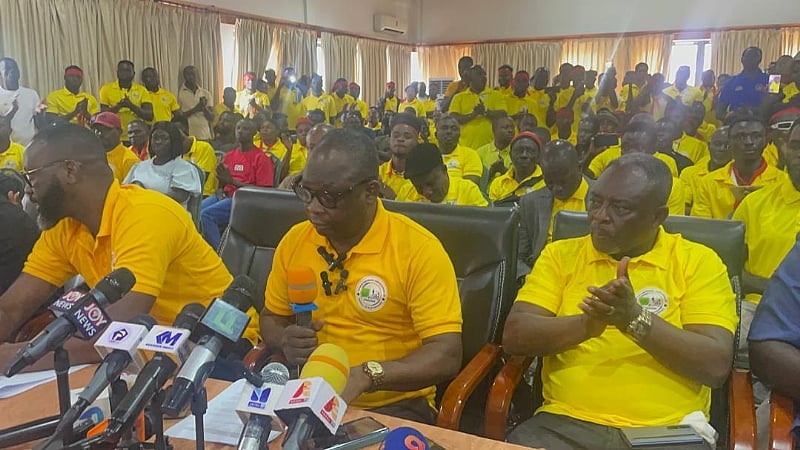The Ghana National Association of Small Scale Miners (GNASM) has leveled serious accusations against high-ranking government officials and security personnel, alleging a deliberate and orchestrated campaign of intimidation and dispossession targeting legally operating small-scale miners. The association claims that these officials, entrusted with upholding the law and protecting the interests of Ghanaian citizens, are instead actively colluding with illegal Chinese mining operations. According to GNASM, these officials have forcefully seized legally acquired mining concessions from their rightful owners, Ghanaian small-scale miners, and subsequently transferred these concessions to illegal Chinese miners. This alleged act of collusion not only undermines the rule of law but also deprives Ghanaian miners of their livelihoods while simultaneously enriching foreign actors operating outside the legal framework. Furthermore, the association alleges that the same security personnel involved in the seizure of the concessions are now providing protection for these illegal Chinese mining operations, creating a system of impunity that further marginalizes Ghanaian miners.
GNASM, through its National Communications Director, Abdul Razak Alhasan, has publicly condemned these actions and issued a series of demands to the government. Speaking at a press conference in Kumasi, Alhasan called for the immediate return of the seized mining concessions and equipment to their rightful owners. He expressed profound disappointment that despite the association’s consistent cooperation with the government’s efforts to combat illegal mining, their members are being unfairly targeted and their livelihoods jeopardized. This sense of betrayal underscores the deep rift that has developed between the small-scale mining community and those tasked with regulating the industry. Alhasan’s statement highlights the irony of the situation: those striving to operate within the legal framework are being penalized while those flagrantly violating the law are being protected. The association contends that even those small-scale miners adhering to responsible and ethical mining practices are being harassed and intimidated by influential political figures within the government.
The association underscores its commitment to supporting the government’s fight against illegal mining, particularly in environmentally sensitive areas designated as RED ZONEs, which include forest reserves, water bodies, and buffer zones. They reiterate their willingness to collaborate with authorities to enforce restrictions and ensure responsible mining practices within these protected areas. However, GNASM emphasizes that their cooperation should not be misconstrued as weakness or acceptance of the unjust treatment their members are currently facing. They vow to advocate fiercely for the rights of their members and will not remain silent while they are unfairly criminalized for pursuing legitimate livelihoods. This firm stance signals a determination to hold the government accountable and protect the interests of small-scale miners who are operating within the bounds of the law.
To address the complex issue of illegal mining and protect the rights of legitimate small-scale miners, GNASM has put forth a set of concrete recommendations to the government. First, they call for increased resources and funding for the National Anti-illegal Mining Operation Secretariat (NAIMOS) to enable a more coordinated and effective approach to combating illegal mining activities. This enhanced capacity would allow NAIMOS to better monitor and enforce regulations, ensuring that all mining operations, both large and small-scale, adhere to environmental and legal standards. Second, the association demands stronger protection for licensed small-scale miners, including the establishment of clear protocols for police operations on mining sites to prevent abuses of power and ensure that legitimate operations are not disrupted or unjustly targeted.
Furthermore, GNASM advocates for a more nuanced approach to dealing with illegal miners, suggesting engagement and collaboration as a means to address the root causes of illegal mining. They propose working with illegal miners to remediate the environmental damage caused by their activities and, where possible, facilitate their integration into the formal mining sector. This approach recognizes the complexity of the issue and the need to address the socio-economic factors that drive individuals towards illegal mining. Simply resorting to punitive measures without addressing the underlying causes is unlikely to be a sustainable solution. The association also calls for increased capacity building within security agencies to ensure a better understanding of small-scale mining operations and licensing regimes. This improved understanding would help differentiate between legal and illegal operations and prevent the unwarranted harassment of licensed miners.
Finally, GNASM urges the inclusion of regulatory agencies, such as the Minerals Commission, in task force operations to provide oversight and prevent the abuse of licensed small-scale miners. This collaborative approach would ensure that enforcement actions are carried out in a fair and transparent manner, with due respect for the rights of legal operators. The association’s demand for the immediate release of all excavators and other machinery seized from licensed small-scale mining sites underscores their commitment to protecting the investments and livelihoods of their members. These seizures, they argue, are often carried out without due process and represent a significant economic hardship for the affected miners.
In summary, the Ghana National Association of Small Scale Miners has raised serious concerns about the alleged complicity of government officials and security personnel in facilitating illegal Chinese mining operations at the expense of legally operating Ghanaian small-scale miners. Their calls for greater transparency, accountability, and protection for legitimate miners highlight the urgent need for comprehensive reforms within the mining sector to ensure a fair and sustainable industry that benefits all stakeholders, including local communities and the environment. They have outlined a clear set of recommendations that, if implemented, could significantly improve the governance of the small-scale mining sector and contribute to a more just and equitable distribution of the benefits derived from Ghana’s mineral resources.


